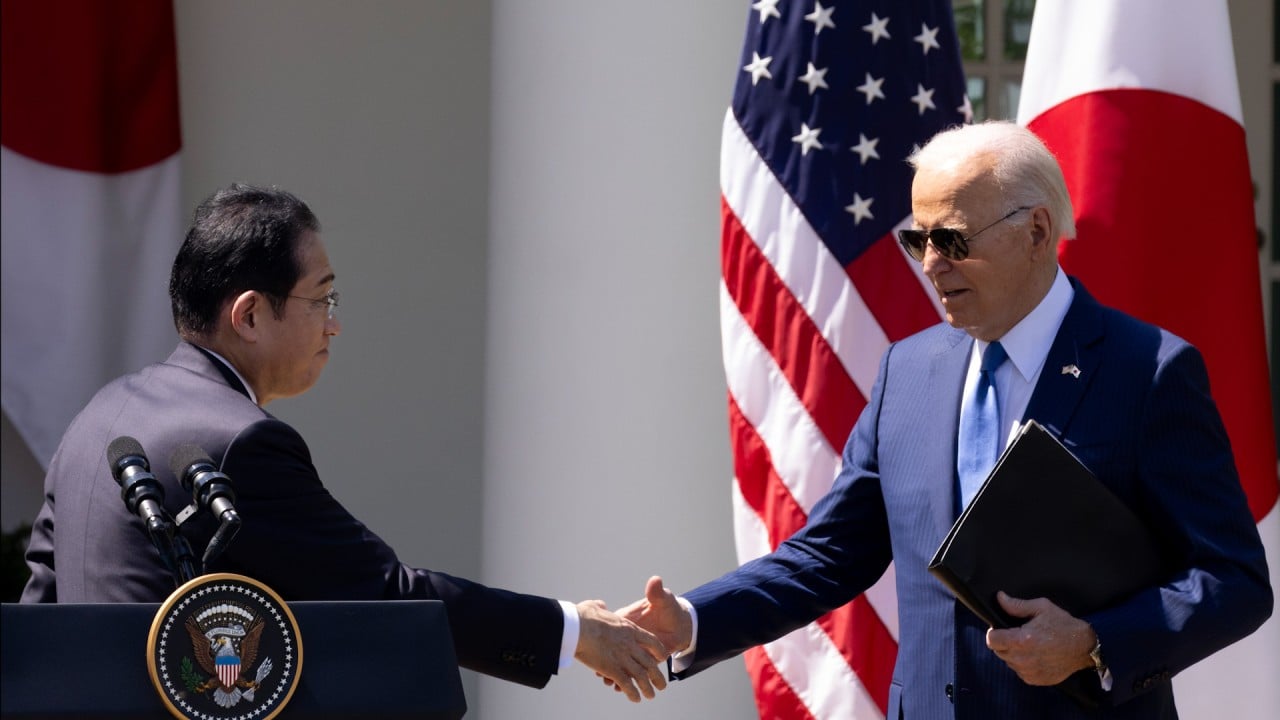
Beijing accuses US and Japan of ‘smears’ over Taiwan and South China Sea after Biden-Kishida summit
- Comments follow US president’s meeting with Japanese leader, where they unveiled a series of deals to strengthen military and economic ties to counter China
- Foreign ministry spokeswoman says Beijing is ‘strongly dissatisfied’ and accuses Tokyo and Washington of interfering in China’s internal affairs
Foreign ministry spokeswoman Mao Ning said in Beijing on Thursday that the two countries should “not target or jeopardise the interests of other countries, or undermine peace and stability in the region”.
“China firmly opposes the cold war mentality and the practice of small-clique politics, as well as words and deeds that create and intensify contradictions to the detriment of the strategic security and interests of other countries,” she said.
“China is strongly dissatisfied with and resolutely opposes this, and has lodged solemn representations with the parties concerned.”
Mao also hit out at US President Joe Biden and Japanese Prime Minister Fumio Kishida over a joint statement that said China’s “accelerating build-up of its nuclear arsenal without transparency nor meaningful dialogue poses a concern to global and regional stability”.
Biden, Kishida, Marcos Jnr meet to show support amid China incidents: US officials
“The so-called concerns expressed by the United States and Japan about China’s nuclear policy are totally divorced from facts and nothing but a false narrative with malicious motives, which China firmly opposes and will never accept,” Mao said.
Biden and Kishida on Wednesday unveiled 70 agreements spanning fields such as defence, space, culture, diplomacy and research, which Biden described as “the most significant upgrade of our alliance since it was first established”.
At a joint press conference at the White House with Kishida on Wednesday, Biden referred to Japan’s own long-running territorial dispute with China over the Diaoyu Islands, which are known as the Senkakus in Japan.
Biden also commended the Japanese leader for “standing strong with the United States as we stand up for freedom of navigation, including in the South China Sea, and as we maintain peace and stability across the Taiwan Strait”.
In response, Kishida said they had agreed to “continue to respond to challenges concerning China through close coordination”.
He added that he and Biden agreed on the importance of peace and stability in the Taiwan Strait and supported a peaceful resolution.
Stars of J-pop, Hollywood and tech attend Kishida state dinner at White House
Most countries, including the US and Japan, do not recognise Taiwan as an independent state, but oppose any attempt to change the status quo by force. Washington is also legally bound to arm Taiwan to help it defend itself.
Beijing views Taiwan as a breakaway province that must be reunited with mainland China – by force if necessary – and Mao said on Thursday the issue was a domestic matter in which “no internal forces are allowed to interfere”.
She added: “Both the US and Japanese government have made solemn promises to China on the issue of Taiwan, and Japan, in particular, which bears the grave historical responsibility for its invasion and colonial rule over Taiwan [between 1895 and 1945], should especially honour its promises and be prudent in its words and actions.
“We urge the US side to translate into action President Biden’s pledge that the US will not support Taiwan independence.”

Since taking office in 2021, the Biden administration has significantly bolstered its alliances in the Indo-Pacific to counter Beijing’s growing influence.
In another move that Beijing worries could further compromise its strategic interests, the US, Japan and South Korea unveiled a pact in August that said the three countries would treat any security threat to one of them as a threat to all of them.
At the joint press conference on Wednesday, Biden also said Britain would join Japan and the US for military exercises, while Aukus was exploring “how Japan can join our work in the second pillar, which focuses on advanced capabilities, including artificial intelligence [and] autonomous systems”.


